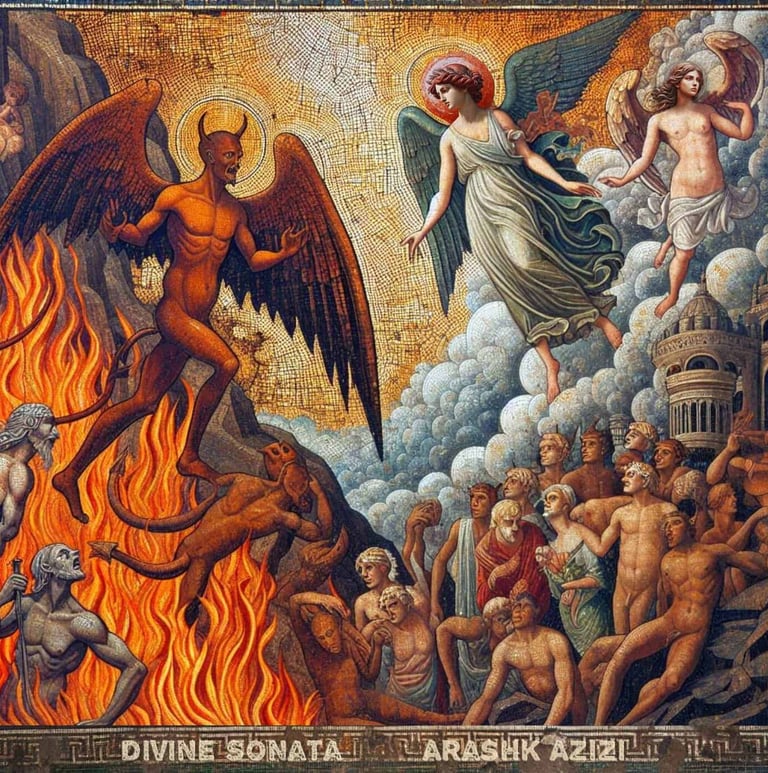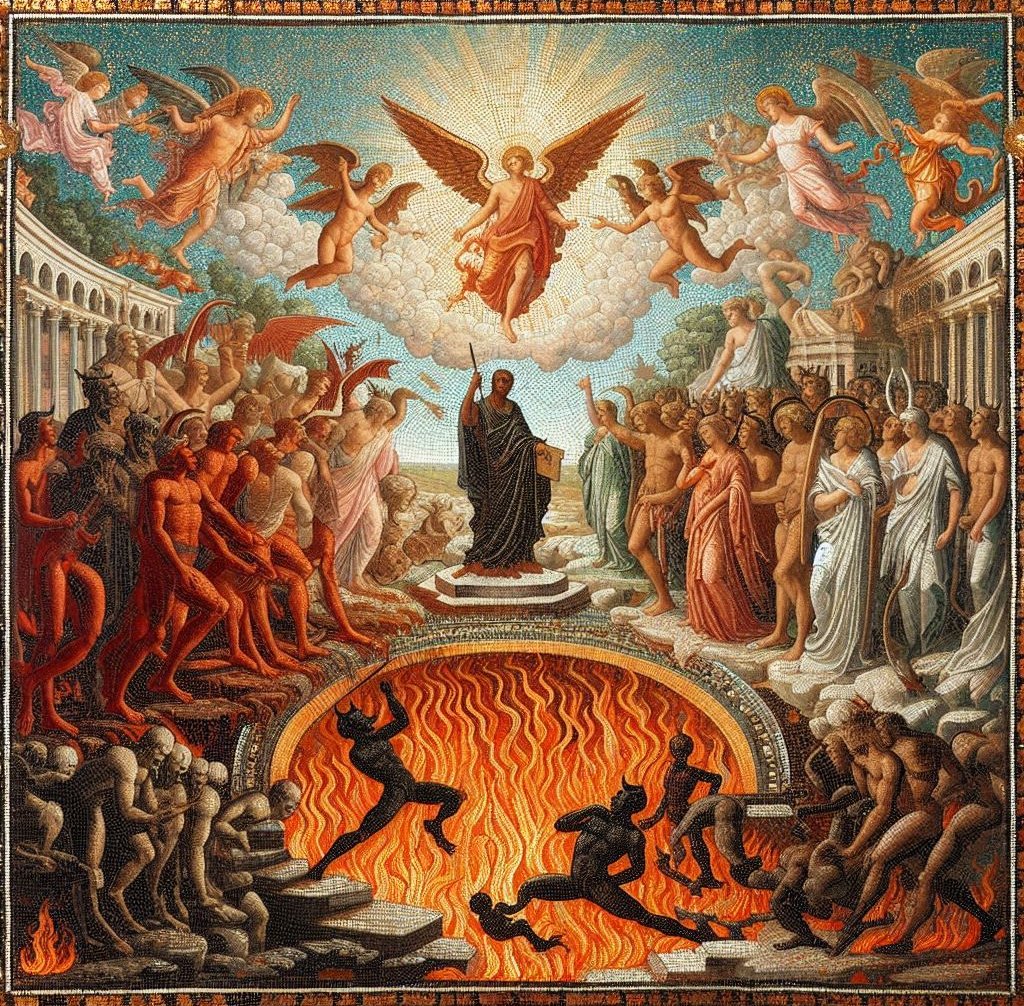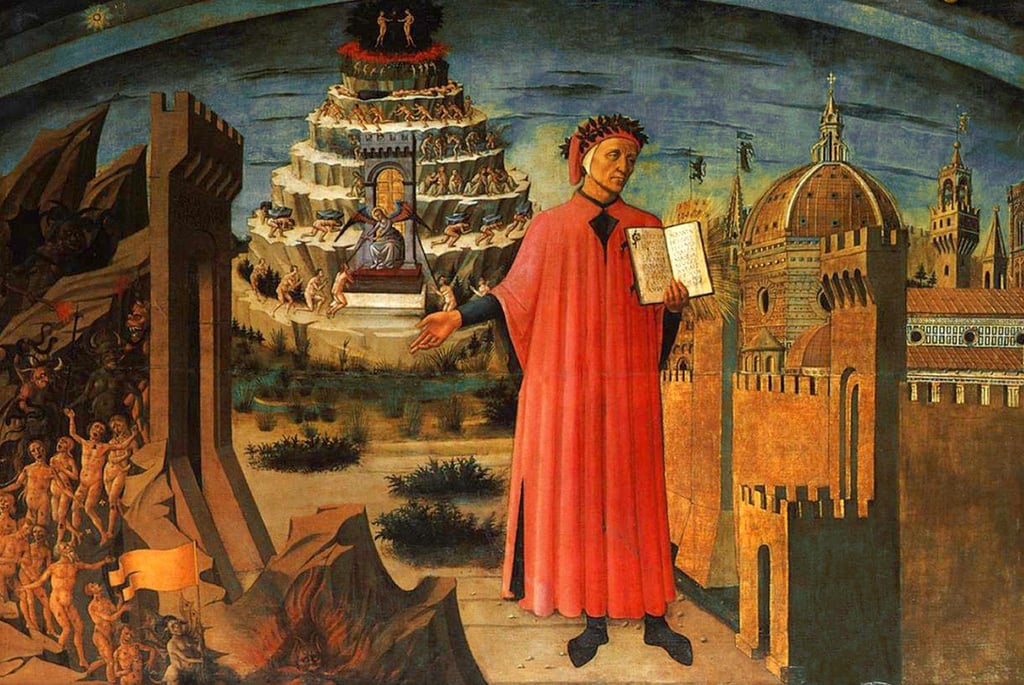Divine Sonata is a three-movement solo piano work by composer and pianist Arashk Azizi, inspired by Dante Alighieri’s Divine Comedy. This work reimagines Dante’s journey through Inferno, Purgatorio, and Paradiso through the lens of today’s world — where the flames of Hell are wars and oppression, Purgatory is a turbulent hope for change, and Paradise is the quiet arrival at peace.
Divine Sonata


The Composition
Overall Structure
The sonata consists of three movements, each representing one part of The Divine Comedy:
Inferno — C minor
Purgatorio — D minor
Paradiso — A major
This tonal journey moves from darkness to light, from the despair of C minor to the radiance of A major. The recurring main theme appears in all three movements, transformed to reflect the changing stages of the journey.
Commission and Premiere
Divine Sonata was commissioned by Ge.Ne.Ra for the Dante Festival 2024 in Ravenna, Italy, to celebrate the Supreme Poet on the 703rd anniversary of his death. The world premiere took place on 26 September 2024 in the Basilica di San Francesco and performed by Arashk Azizi, only steps away from Dante’s tomb. This historically and spiritually resonant setting gave the first performance an added weight — a conversation between the modern reimagining of Dante’s work and the city that preserves his memory.
Inferno
Motto: "Lasciate ogni speranza, voi ch'entrate."
(Abandon all hope, ye who enter here.)
The opening movement begins with a bitonal chord — A major and C minor — symbolizing the clash of light and darkness. While A major foreshadows the ultimate resolution in Paradiso, C minor drags us into the descent of Inferno.
A chromatic fall leads into the main theme, which undergoes several variations representing the different steps of the Inferno. Each variation grows darker, denser, and more dissonant.
The rhythm shifts frequently: 4/4 to 8/8 to 13/8, culminating in the last step — the encounter with the Devil — in 12/8. Influences of Liszt, Rachmaninov, and Verdi’s Dies Irae are evident in its dramatic weight and orchestral sonorities at the piano. The movement ends ambiguously in the key of D, opening the path to Purgatorio.
Midway upon the journey of our life,
I found myself within a forest dark,
For straightforward pathway has been lost
O Muses, O high genuine, now assist me!
O memory, that didst write down what I saw,
Here thy nobility shall be manifest!
Upon this journey, whence thou givest him vaunt,
Things did he hear, which the occasion were
Both of his victory and the papal mantle.
Through me the way is to the city dolent;
Through me the way is to eternal dole;
Through me the way among the people lost.
Before me there were no created things,
Only eterne, and I eternal last.
All hope abandon, ye who enter in.
Purgatorio
Motto: "L'anima, colpevole e confinata per sua colpa, è punita e, sebbene si sia pentita, deve attendere la misericordia di Dio."
(The soul, uneasy and confined from its own fault, is punished and, though it has repented, must wait for the mercy of God.)
The second movement opens in D minor, but the harmony is constantly shifting. In Purgatorio, there is no stable ground — no fixed rhythm or clear tonal center. The music alternates between moments of fragile beauty and sudden turbulence.
Rhythms fracture with syncopations, irregular meters, breaks, sudden jumps, and constant key changes. Unlike the descending lines of Inferno or the ascending phrases of Paradiso, here the melodies leap unpredictably, refusing to settle.
This restlessness reflects the soul’s state in Purgatory — longing for redemption but unable to reach it yet. Influenced by Expressionism and Serialism, the movement concludes in A, a glimpse of the peace to come.
To run o’re better waters hoists its sail
The little vessel of my genius now,
That leaves behind itself a sea so cruel.
But let dead Poesy here rise again,
O holy Muses, since that I am yours,
And here Calliope somewhat ascend.
My song accompanying with that sound,
Of which the miserable magpies felt
The blow so great, that they despaired of pardon.
Long since we all were slain by violence,
And sinners even to the latest hour.
The world forsooth is utterly deserted
By every virtue, as thou tellest me,
And with iniquity is big and covered;
But I beseech thee point me out the cause,
That I may see it, and to others show it.
Paradiso
Motto: "Nel suo volere è nostra pace."
(In His will is our peace.)
The final movement begins with a single low A, followed by the main theme now in bright A major, played high on the keyboard. This is the first time the sonata breathes fully in its final key, symbolizing arrival.
The movement unfolds through seven variations, each growing more luminous. The melodic lines are clear and ascending, the harmonies transparent, the textures open — drawing influence from minimalist clarity in the spirit of Arvo Pärt.
Where Inferno shouts and Purgatorio struggles, Paradiso simply is — serene, resolved, and radiant. The work ends in pure A major, the sound of rest.
Truly whatever of the holy realm
I had the power to treasure in my mind
Shall now become the subject of my song,
O good Apollo, for this last emprise
Make of me such a vessel of thy power
As giving the beloved laurel asks!
O ye, who in some pretty little boat,
Eager to listen, have been following
Behind my ship, that singing sails along,
Well may you launch upon the deep salt-sea
Your vessel, keeping still my wake before you
Upon the water that grows smooth again.
True is it, that as oftentimes the form
Accords not with the intention of the art,
Because in answering is matter deaf,
Here vigour failed the lofty fantasy:
But now was turning my desire and will,
Even as a wheel that equally is moved,
The love which moves the sun and the other stars.
(All of the phrases are depicted from the "Divine Comedy" translated by Henry Wadsworth Longfellow, Sterling publishing.)
A Modern Reimagining of Dante
In Arashk Azizi’s Divine Sonata, Dante’s timeless journey is not merely retold — it is transformed into a reflection of our own age. While rooted in the Divine Comedy, the sonata becomes a mirror held up to the 21st century, contemplating human society through music.
In Arashk’s vision:
Inferno is no longer confined to medieval images of fire and torment. It is the living hell we create for ourselves: the wars that scar entire nations, the systemic oppression that crushes human dignity, the cruelty we inflict upon one another. It is the noise of a world losing its moral compass, where despair grows louder than hope.
Purgatorio is the space between suffering and peace — a realm of turbulence, instability, and restless searching. In the sonata, it takes form as shifting rhythms, unpredictable leaps, and melodies that refuse to settle. It is humanity’s attempt to rise, to heal, to believe again — yet always caught in cycles of doubt and regression.
Paradiso, in Arashk’s version, is not the triumphant vision of perfect harmony promised by religious tradition. It is a more fragile, human idea of paradise: a faint but persistent hope for peace and stability. It is the quiet light that survives after devastation, the moment when the storm has passed and the world exhales — not perfect, but enough to keep us going.
In this way, Divine Sonata becomes less a medieval allegory and more a contemporary meditation on our collective journey: from the depths of human cruelty, through the uncertainty of transformation, toward the fragile but vital hope for peace. It is both personal and universal — Dante’s journey reborn in the language of our times, told through the voice of the piano.


About the Divine Comedy
The Poem
Written by Dante Alighieri between 1308 and 1321, La Divina Commedia (The Divine Comedy) is one of the greatest literary works in world history. The poem is an allegorical vision of the soul’s journey toward God, divided into three parts:
Inferno — the descent through Hell
Purgatorio — the ascent of Mount Purgatory
Paradiso — the vision of Heaven
It is both a deeply personal spiritual journey and a vast moral, philosophical, and political statement on Dante’s own world.
Dante’s Life
Dante Alighieri (1265–1321) was born in Florence, Italy. A poet, philosopher, and political thinker, he lived during a time of intense political conflict. His exile from Florence deeply shaped his work, and The Divine Comedy was written during his years of wandering.
Dante died in Ravenna in 1321, and his tomb remains there — a place of literary pilgrimage for centuries. His vision of the afterlife has influenced countless writers, artists, and composers for over 700 years.

